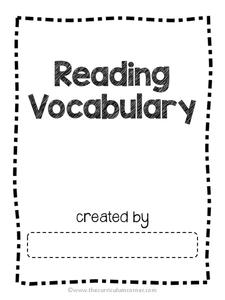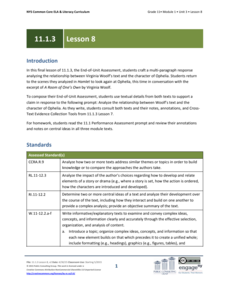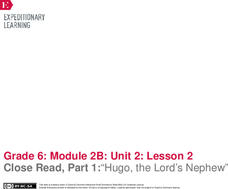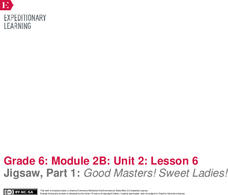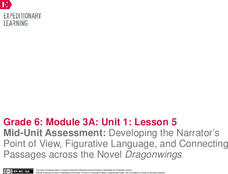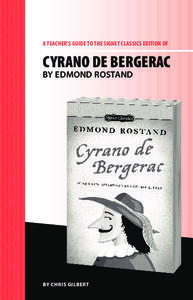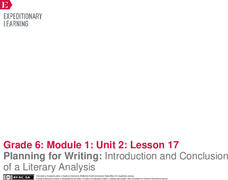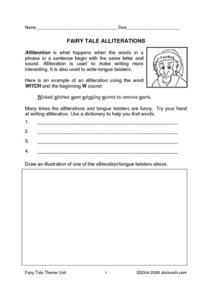Curated OER
The Negro Speaks of Rivers Themes
In this poetry analysis worksheet, students respond to 5 discussion questions that require them to investigate the symbolism of rivers in the Langston Hughes poem “The Negro Speaks of Rivers."
Florida Center for Reading Research
Comprehension: Narrative Text Structure, Story Pieces
An activity boosts reading comprehension by challenging scholars to answer questions about a narrative tale detailing elements—plot, characters, setting, theme, problem, and solution.
Curriculum Corner
Academic Reading Vocabulary
From A to Z, learners define, draw, and find examples of specific reading focus skills in an alphabetized reading vocabulary packet. Words include dialogue, theme, text structure, genre, paraphrase, and many more.
Bermudian Springs School District
John Steinbeck The Grapes of Wrath — Independent Reading
Lies, deceit, betrayal, criminality: these topics are just a few of the reasons that John Steinbeck's classic novel The Grapes of Wrath has captivated people since its 1939 publication. Scholars begin the lesson by reading background...
EngageNY
Grade 10 ELA Module 4: Unit 2, Lesson 2
What is the best way to determine the theme of a text? Pupils analyze how central ideas emerge in Shakespeare's tragedy Macbeth. They work in small groups and engage in a whole-class discussion to discuss the play's plot. Finally,...
Literacy Design Collaborative
Whom Do We Trust, and Why?
Is it possible to regain trust? Scholars put much thought into the subject of trust after reading Shakespeare's Macbeth. Readers work together to analyze how the character relationships develop the a message about trust. They then create...
EngageNY
Grade 11 ELA Module 1: Unit 3, Lesson 8
How does the theme of gender inequality develop in Virginia Woolf's A Room of One's Own and Shakespeare's Hamlet? Pupils craft a multi-paragraph response to analyze the relationship between the texts. They use evidence from both works to...
EngageNY
Analyzing How Shakespeare’s Play Draws upon Greek Mythology: Part 3
How do the narrative and play versions of the myth "Pyramus and Thisbe" affect meaning? Scholars reread Act 5, Scene 1 from Shakespeare's A Midsummer Night's Dream and compare its structure to "Pyramus and Thisbe." Next, they use a...
EngageNY
Analyzing a Thematic Concept: The Invisibility of Captives during WWII (Pages 182-188)
Readers complete a word web-based on the word dignity. They use their Understanding Invisibility note catcher to discuss how dignity relates to the theme of invisibility. After group discussion comparing invisibility and loss of dignity,...
EngageNY
Drafting an Analytical Mini-Essay: Using Partner Talk and Graphic Organizers to Guide Thinking
Moving on up ... Scholars take a look at how the author of the model essay Elements of Mythology and Theme of Cronus moved up in the writing process from a graphic organizer to an essay. After walking through the writing process of the...
EngageNY
Close Read, Part 1: “Hugo, the Lord’s Nephew”
Fourth time is a charm. Learners complete multiple reads of Hugo, the Lord’s Nephew. On the fourth read, they make notes about each page on sticky notes. They then complete a think-pair-share activity with a partner to determine the...
EngageNY
Jigsaw, Part 1: Good Masters! Sweet Ladies!
Complete a puzzle one piece at a time. Scholars gather in triads to complete jigsaw activities over a monologue from Good Masters! Sweet Ladies. They read as a group and independently and use sticky notes to identify the gist of each...
EngageNY
Mid-Unit Assessment: Developing the Narrator’s Point of View, Figurative Language, and Connecting Passages across the Novel Dragonwings
Let's get creative! As part of a mid-unit assessment, scholars create a piece of artwork illustrating the theme from Laurence Yep's novel, Dragonwings. Additionally, pupils use a graphic organizer to identify figurative language in the...
Penguin Books
A Teacher's Guide to the Signet Classics Edition of Cyrano de Bergerac by Edmond Rostand
Edmond Rostand's Cyrano de Bergerac has enjoyed popularity since its debut in 1897 due in large part to the themes it addresses. Instructors planning on using the play with their classes will find much to like in this teaching guide. The...
K20 LEARN
Lord of the Flies Unit, Lesson 8: In The End
To end the unit, groups use the Honeycomb Harvest strategy to show connections among a character, symbols, and themes in the novel and then create an Anchor Chart for the character that includes a symbol that best represents him. They...
Curated OER
Abigail in Mourning
People deal with grief in different ways. The series of Abigail Adams' letters in this lesson reveals how she dealt with losing her mother, father, and community members. The included worksheet helps young scholars identify the tone and...
Curated OER
Abigail as Mother (Part 1)
In part one of a two-part series, scholars compare two of Abigail Adams' letters: one to her son and the other to her daughter. Researchers use the provided worksheets to contrast evidence of the tone and themes in the two letters.
EngageNY
Connecting Literary and Informational Texts: Cronus and “The Key Elements of Mythology”
Is there a connection? Scholars work to make connections between Myth of Cronus and The Key Elements of Mythology. First, they circle important words in the text and look for similarities. They then revisit the concept of theme and...
EngageNY
Planning for Writing: Introduction and Conclusion of a Literary Analysis
It's all about the introduction. Scholars work on the introductory paragraph for their essays, connecting the theme of a myth and The Lightning Thief. They use a graphic organizer to help focus their work and then move to working on the...
Curated OER
Comparing Themes
Pupils explore themes through the novels The Hobbit and The Fellowship of the Ring by J.R.R Tolkien. For this literature lesson, students identify the themes in each novel and find supporting evidence that develops them. Pupils write an...
Curated OER
Making a Sculpture of the "Theme"
Students brainstorm by jotting down ideas or diagrams ideas that will assist them to create an original sculpture and then, construct their own sculpture on the "theme." They create a sculpture and take a digital photograph of their...
Curated OER
Peace Posters
Learners focus on a theme to create a poster or collage. In this theme based art project, students communicate their peace theme through drawings to communicate their present feeling and ideas. Learners learn the emotions conveyed in the...
Curated OER
Reader's Theater
Conduct a Reader's Theater. Third, fourth, and fifth graders rewrite books with a baseball theme to a Reader's Theater format. They form groups of four or five, practice reading the script, and then perform it for an audience.
Curated OER
Fairy Tale Alliterations
Fairy tales are the perfect way to focus on alliteration. Learners complete activities relating to alliteration and similes using a fairy tale theme. Then, they complete an acrostic poem using the words fairy tale.




